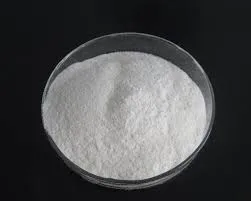
Лис . 18, 2024 13:14 Back to list
mhec-methhyl hydroxyethyl cellulose manufacturer
The Importance and Versatility of Methyl Hydroxyethyl Cellulose Manufacturers
Methyl Hydroxyethyl Cellulose (MHEC) is a non-ionic, water-soluble polymer that plays a critical role in various industries due to its thickening, binding, and film-forming properties. As a derivative of cellulose, MHEC is synthesized from natural polysaccharides, making it a biodegradable and eco-friendly choice for many applications. The rising demand for MHEC has led to the emergence of numerous manufacturers worldwide, each striving to meet specific market needs. Understanding the significance of MHEC and the role of its manufacturers can provide insights into its applications and market trends.
What is Methyl Hydroxyethyl Cellulose?
Methyl Hydroxyethyl Cellulose is produced by the reaction of alkali cellulose with methyl chloride and ethylene oxide. This complex synthesis process results in a unique compound that retains the essential characteristics of cellulose while enhancing its usability in numerous applications. MHEC is characterized by its excellent water retention capabilities and high stability at varying temperatures and pH levels, making it a preferred choice in many formulations.
Applications of MHEC
MHEC is widely used in various industries, each benefiting from its unique properties
1. Construction In the construction industry, MHEC is commonly used as a thickening agent in plaster, mortar, and tile adhesives. Its water retention properties ensure better adhesion and workability. Moreover, MHEC helps control the consistency of construction materials, providing optimal performance during application.
2. Paints and Coatings The paint industry utilizes MHEC as a thickener and stabilizer. It helps improve the suspension of pigments and enhances the overall flow and application properties of paints. With increasing trends toward low-VOC and eco-friendly products, the demand for MHEC in this sector has significantly increased.
3. Food Industry In the food sector, MHEC serves as a stabilizer, emulsifier, and thickening agent for various products such as sauces, dressings, and dairy items. Its safety profile and non-toxic nature make it suitable for food applications, where it helps improve texture, mouthfeel, and shelf-life.
4. Pharmaceuticals and Cosmetics MHEC is also found in the pharmaceutical and cosmetic industries, where it is used for its thickening and binding properties. In topical formulations, MHEC acts as a moisturizing agent and stabilizer, improving the viscosity and application ease of creams and lotions.
5. Personal Care Products MHEC is frequently used in shampoos and conditioners to enhance texture and manageability. Its film-forming properties can provide a protective barrier on hair, enhancing shine and reducing frizz.
mhec-methhyl hydroxyethyl cellulose manufacturer

Choosing the Right MHEC Manufacturer
Selecting a reliable MHEC manufacturer is crucial for industries that depend on the quality and consistency of their raw materials. When choosing a manufacturer, factors to consider include
- Quality Control The manufacturer should adhere to strict quality control measures, ensuring that the MHEC produced meets industry standards. Certificates of analysis and compliance with regulations are vital indicators of quality.
- Customization Different applications require different grades of MHEC. A manufacturer that offers customizable solutions can better cater to specific industry needs, providing tailored products that meet performance requirements.
- Research and Development An established manufacturer should invest in R&D, continually improving their products and keeping pace with industry trends.
- Sustainability As consumers become more environmentally conscious, partnering with a manufacturer that focuses on sustainable practices becomes increasingly important. This includes using eco-friendly raw materials and processes that minimize environmental impact.
- Technical Support Strong technical support and partnership possibilities can significantly enhance the application of MHEC in formulations, leading to better product performance and innovation.
Future Trends
The MHEC market is projected to grow owing to its versatile applications and the increasing trend towards sustainable and environmentally friendly products. Manufacturers are likely to focus on improving the efficiency of their processes and exploring new applications in emerging markets.
In conclusion, Methyl Hydroxyethyl Cellulose is a vital component for various industries, underpinned by a network of dedicated manufacturers. As consumer demands evolve, these manufacturers will continue to adapt, offering innovative solutions that enhance product quality and sustainability. The future of MHEC looks promising, reflecting a growing trend towards smarter manufacturing and sustainable practices.
-
What is HPMC?
NewsJun.06,2025
-
Understanding Redispersible Powder: The Future of Construction Materials
NewsJun.06,2025
-
Understanding RDP Powder: The Ultimate Solution for Your Construction Needs
NewsJun.06,2025
-
Pure HPMC: The Ideal Solution for Modern Construction and Building Materials
NewsJun.06,2025
-
Methyl Hydroxyethyl Cellulose: A Versatile Chemical Compound
NewsJun.06,2025
-
Hydroxyethyl Cellulose Power: The Essential Chemical for Various Industries
NewsJun.06,2025







